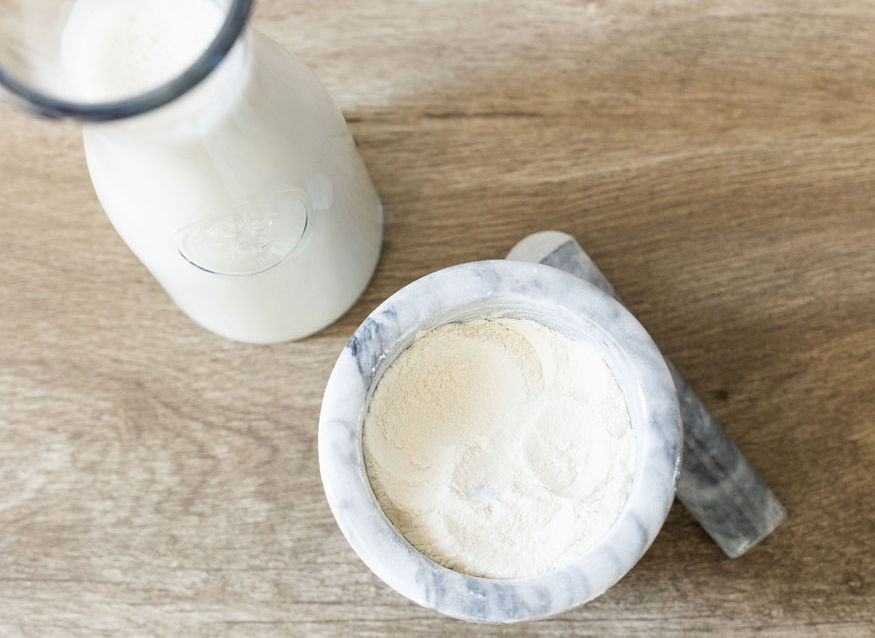Global dairy co-op Fonterra has signed a multi-year joint development agreement with biomass fermentation startup Superbrewed Food to explore the potential of its “postbiotic” ingredient.
Under the agreement, Fonterra—which also makes ‘animal-free’ dairy proteins via precision fermentation at Vivici, a startup formed with DSM in 2022—will assess how the protein-packed ingredient might complement its portfolio.
It is also exploring using lactose permeate, a byproduct of milk protein production, as a feedstock for Superbrewed Food’s microorganisms, creating a circular solution, said Superbrewed Food founder Dr. Bryan Tracy.
“Fonterra has evaluated our current commercial ingredient and found it to have quite compelling functionality and nutrition,” said Tracy, who has secured TO VC as the lead investor in a series B round he aims to complete this year.
“They are looking at how to address demand for sustainable protein sources that complement dairy, precision-fermented dairy, and plant-based ingredients, as they’re invested in all of these areas.”
“It’s a very flexible ingredient so there are lots of different use cases,” added Tracy, who has partnered with Döhler to dedicate “substantial fermentation capacity” to the production of the postbiotic at one of Döhler’s facilities, with large quantities set to hit the market later this year ahead of product launches early next year.
He added: “During our conversations, Fonterra also talked about the amount of lactose [milk sugar] generated through their own dairy processing, so the question became, could your organism or others in your library utilize lactose [as opposed to glucose] as a feedstock? And the answer is yes, we’ve found another species [of bacteria] that can feed on lactose and also make a compelling ingredient that could be complementary to our existing product.”
“Fonterra is excited by the potential to enhance the functional and nutritional performance of foods using ingredients sourced from new technologies such as those used by Superbrewed Foods and that can be complementary to our dairy sourced ingredients and business.” Chris Ireland, general manager, innovation partnerships, Fonterra

85% protein content, neutral color and taste
Superbrewed Food’s non-GMO bacterial biomass has unusually high protein content (85%), a PDCAAS (protein digestibility) score of 0.91 (which ranks higher than most plant proteins), and high levels of B vitamins including B12, plus minerals including iron and zinc.
With a neutral taste, natural white color, excellent pH and temperature stability, and good emulsification properties, the C. tyrobutyricum strain is attracting interest in a wide variety of products, claimed Tracy, who received a ‘no questions’ letter from the FDA this year affirming the ingredient’s GRAS (Generally Recognized as Safe) status.
“We’re working with some large players, a couple of distributors, and some smaller players, spanning everything from shelf stable snacks to sports nutrition, along with our dairy and alt dairy partnerships [one of which is with BabyBel maker Bel Group], and expect to see the first products [containing the postbiotic] hit the market in Q1, 2025.”
Biomass and precision fermentation are not the same
Rather than using genetic engineering to “program” microbes to produce target proteins, Superbrewed Food is working with a bacterium that naturally produces high levels of protein when grown in an anaerobic [without oxygen] environment using sugars from a variety of feedstocks.
Unlike precision fermentation companies that are left with large amounts of microbial biomass at the end of each batch that is either thrown away or sent to the animal feed market, Superbrewed Food is harvesting the whole biomass to make a whole food ingredient. It has a co-product—butyric acid—for which there is an established market, noted Tracy.
“We want to valorize everything. The postbiotic will generate the lion’s share of the revenue, but butyric acid is not insignificant. Most companies use fermentation to make a chemical and then see the biomass as an afterthought. We flipped the script.”
Marketing bacterial protein
While protein-packed microbes may not sound very consumer friendly, the notion of consuming bacteria has become very well established thanks to probiotics, said Tracy. Although in the case of Superbrewed Food, the bacteria are not “live,” but are fully deactivated, he stressed. “They’re entirely dead, and non spore-forming.”
According to Superbrewed Food, its bacterium meets the definition of “postbiotic” laid out in an ISAPP (International Scientific Association for Probiotics and Prebiotics) consensus paper (‘a preparation of inanimate microorganisms and/or their components that confers a health benefit on the host’).
Manufacturing
Superbrewed has sold an ethanol plant it had acquired in Little Falls, Minnesota for large-scale anaerobic fermentation and is evaluating alternative sites to retrofit for greater production capacity, said Tracy. “Superbrewed has booked sales into 2027 that will exceed the capacity of its manufacturing partnership with Döhler. Accordingly, the company decided to seek an alternative site in the US that could be converted to produce larger volumes than the Little Falls retrofit could support. Thus, we are evaluating other site options that could support larger and faster production capacity.”
TO VC: ‘Of all the microbial protein companies that we have evaluated, Superbrewed is the most advanced’
Joshua Phitoussi, managing partner at investor TO VC told AgFunderNews: “We’ve been looking for a protein solution that offers a no-compromise value proposition to the CPG customer. For example, you could find protein that is cheap, or nutritious, or functional, but never all at the same time. Superbrewed’s product solves this trade-off, and C. tyrobutyricum’s exceptional physical, mechanical, and nutritional characteristics as a protein ingredient are central to this value proposition.
“We believe that within the alternative protein space, microbial proteins are an extremely compelling category. The rapid growth rates of microbes, feedstock flexibility, and high protein, mineral, and vitamin levels create three core advantages: First, this segment can reach cost levels at scale that only the cheapest plant proteins can reach, yet with far superior nutrition and functionality characteristics. Second, manufacturing scale-up could be much easier than other biotech solutions given the simplicity of the fermentation process for most organisms. Third, the production of fermentation co-products offers multiple revenue streams that add to the bottom line.
“Of all the microbial protein companies that we have evaluated, Superbrewed is the most advanced in regulatory, manufacturing, and commercial aspects. The company has signed a manufacturing agreement with the European CMO Döhler to get to 1,200mt/year by 2026. The goal in 2027 and later is to produce in the US in retro-fitted ethanol assets, either through partnership or acquisition. At scale (2,000mt+), the company’s COGS drop to low single-digit dollars per kg.
“The scalability, low manufacturing threshold to get to breakeven, and the extremely low potential COGS, coupled with the product attributes listed above, are the reasons why we decided to invest in Superbrewed.”





